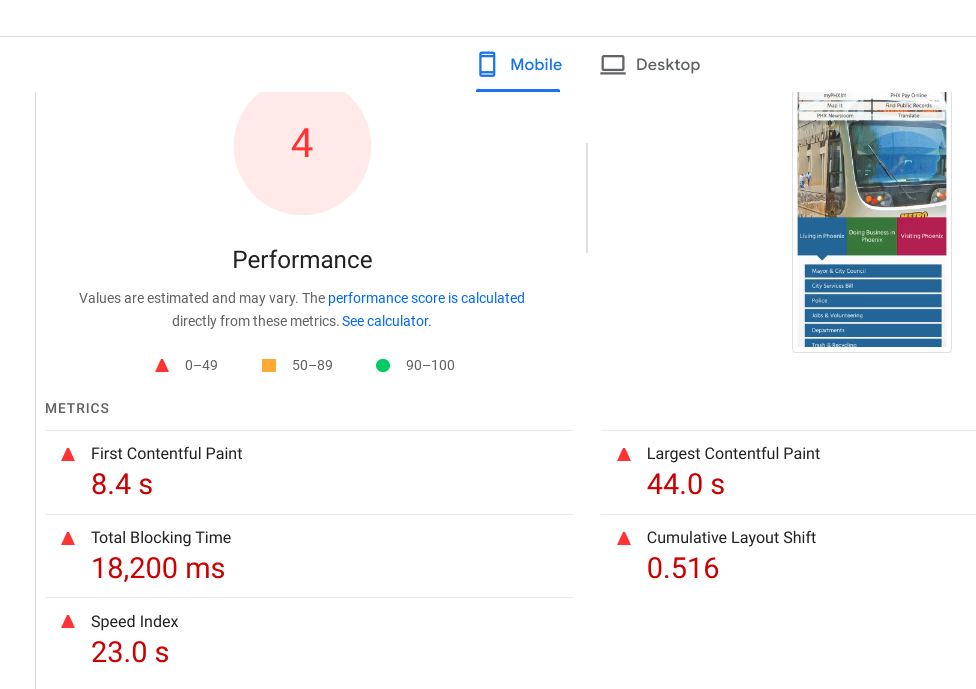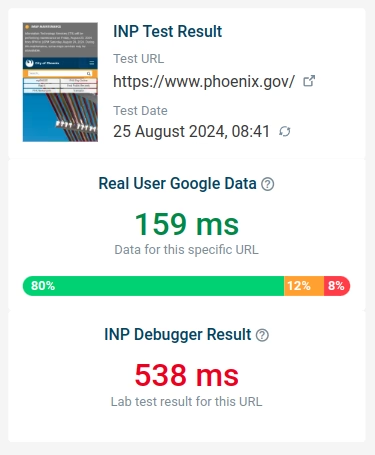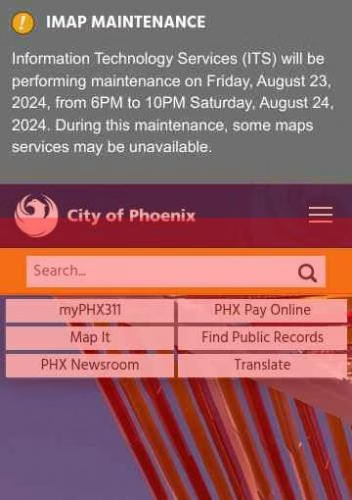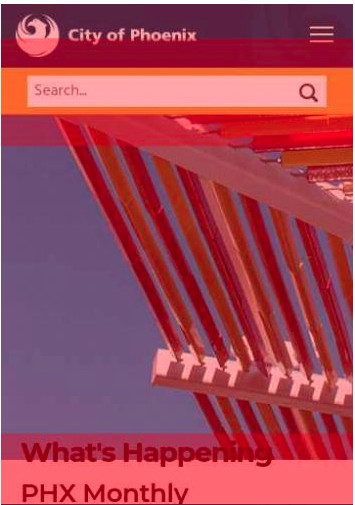Contents
Google’s Core Web Vitals are a set of measures that assess a web page’s visual stability, interaction, and speed of loading. As a result of Google’s announcement that they will be considered when determining search results rankings, they are becoming more and more crucial for companies in Phoenix, AZ.
There are three Core Web Vitals:
-
- Largest Contentful Paint (LCP): This gauges how long it takes for the biggest content component to appear on a page.
-
-
- The LCP measures webpage load performance, specifically how quickly the largest image or text block renders. A good LCP score is within the first 2.5 seconds.
- The LCP is crucial for user experience and SEO, as it impacts perceived load speed and reassures users of the page’s usefulness. This is particularly important in a vibrant, fast-paced state like the city of Phoenix, where users expect quick and efficient web experiences.
-
How does the official City of Phoenix website perform?
Website: https://www.phoenix.gov/
The LCP is pretty bad clocking at 15.5s well beyond the recommended value of max 2.5s.
Here is how slow the website is loading
The existing LCP value is generated mainly from hero image: (div#heroImage) /Hero/H122_Home_Page.jpg.
Go ahead and check the city of Phoenix speed rating here
2. Interaction to Next Paint (INP): measures the responsiveness of a web page by tracking the time between user interactions (like clicks or key presses) and the next visual update, helping assess user experience during interactions. By improving the INP ensures that websites are highly responsive, enhancing user engagement, especially vital for London’s tech-savvy population.
The INP is 159ms, within the recommended value of 200ms.
3. Total Blocking Time (TBT): 13.188ms (well beyond the 200ms threshold!)
TBT measures the amount of time during which the main thread is blocked and unable to respond to user input. It captures the time between the First Contentful Paint (FCP) and Time to Interactive (TTI) where tasks exceed 50ms.
- A high TBT indicates that the main thread is often busy, delaying responsiveness and negatively affecting the user experience.
What that means for User Experience:
-
- Interaction Delays: Users experience delays when clicking buttons, filling out forms, or performing other interactive actions.
- Increased Bounce Rates: Slow and unresponsive websites lead to frustration, causing users to leave the site quickly, increasing bounce rates.
- Reduced User Engagement: Users are less likely to engage with a website that feels slow, leading to lower conversion rates and reduced time spent on site.
What that means for SEO:
-
- Lower Rankings: Google’s algorithm considers user experience metrics, including TBT. High TBT can negatively impact search engine rankings, reducing organic traffic.
- Page Experience Signals: As part of the Core Web Vitals, TBT affects page experience signals. Poor performance can lead to decreased visibility in search results.
HOw to Improve TBT:
-
- Optimize JavaScript: Minimize and defer non-critical JavaScript to reduce blocking time.
- Reduce Long Tasks: Break up long tasks into smaller, asynchronous tasks to prevent blocking the main thread.
- Efficient Resource Loading: Use techniques like code splitting, lazy loading, and optimizing third-party scripts to ensure resources are loaded efficiently.
- Use Web Workers: Offload heavy computations to web workers to keep the main thread free.
4. Cumulative Layout Shift (CLS)
-
-
- is a metric that quantifies how much visual material moves around on a website as it loads.
-
Very bad registering a 1 CLS value, which is failing the target of 0.1.
You can follow these techniques to improve your website’s Page Speed in Phoenix:
1, Improve your image quality because they are a significant cause of slow page loading. Utilize a responsive picture format and reduce the file size of your photographs to optimize them.
2. Minify your CSS and JavaScript: The time it takes for your websites to load can be slashed by minifying the JavaScript and CSS code.
3. Consider using a content delivery network (CDN): By delivering your pages from servers closer to your users, a CDN can aid in accelerating page load times.
4. Utilize a caching plugin: A caching plugin can assist in the storage of static content on your server, enhancing the speed at which your pages load.
5. Test the effectiveness of your website: You may check the functionality of your website using several tools, like Google PageSpeed Insights and WebPageTest.
Here are some extra pointers for enhancing your website’s Core Web Vitals in Phoenix, AZ in addition to the ones mentioned above:
1. For your website, use a minimal theme or template.
2. Limit the number of plugins you use.
3. Place your website on a reliable, and quick server.
4. Update the code on your webpage.
5. Test the functionality of your website frequently.
If you need some help to improve your website’s Page Speed, I could do a performance audit, recommend specific changes, and implement those changes for you.
Enhancing your website’s Page Speed is a crucial first step in raising its overall performance and search engine position.
California is more than just a state
California, also known as the “Golden State,” is a state rich in natural beauty, innovation, and variety. It is tucked away along the western coast of the United States and offers a variety of scenery, from snow-capped mountains to sun-kissed beaches, tall redwood forests to parched deserts. But California’s attraction goes far beyond its breathtaking landscapes; it is a global cultural and economic powerhouse that sets trends and propels advancement.
California’s booming entertainment sector, based in Hollywood, Los Angeles, is one of the state’s most recognizable attractions. It is the birthplace of film, the location where innumerable aspirant actors and filmmakers come to pursue fame and money and where dreams are brought to life on silver screens. Hollywood has had a huge impact on popular culture all across the world, from revolutionary television series to box office hits.
Beyond Hollywood’s glamor and glamour, the core of technological innovation is located in Silicon Valley. This area, which is home to numerous startups and tech behemoths like Apple, Google, and Facebook, is what drives the digital revolution and shapes how we communicate, work, and live. California’s Silicon Valley leads the world in innovation, from ground-breaking breakthroughs in renewable energy to cutting-edge advances in artificial intelligence.
California’s population diversity attests to the state’s reputation as a melting pot of identities and cultures. One of the state’s greatest assets is its lively communities, which reflect a wide range of ethnicities, religions, and backgrounds. The state values variety. California offers a tapestry of experiences that honor the diversity of human heritage, from the vibrant neighborhoods of San Diego’s Little Italy to the busy streets of San Francisco‘s Chinatown.
Travelers who enjoy the great outdoors come to California to experience its amazing scenery, which includes the serene beaches of Lake Tahoe and the untamed cliffs of Big Sur. Within a day’s trip, nature lovers can explore Yosemite National Park’s trails, surf Malibu’s waves, or ski Lake Tahoe’s slopes. Because of the state’s dedication to environmental preservation, these natural treasures will continue to be protected for the enjoyment of future generations.
California has numerous advantages, but it also has drawbacks. There are many challenges to the state’s continued success, including climate change, income disparity, and the cost of housing. Californians, on the other hand, are renowned for their resourcefulness and resilience, and they are not afraid to take on new difficulties and find creative solutions.
California is more than just a state; it represents opportunity and advancement. California never stops captivating the globe with its breathtaking landscapes, cultural landmarks, technological innovations, and dedication to diversity and inclusivity. The Golden State will surely continue to have an impact on future generations’ understanding of history as it beams into the future.




